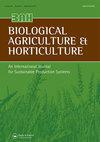Interspecific rootstock can enhance yield of processing tomatoes (Solanum lycopersicum L.) in organic farming
IF 1.6
4区 农林科学
Q3 AGRONOMY
引用次数: 2
Abstract
ABSTRACT At present, consumer concern about the impact of food production on the environment is driving increased demand for high quality and healthy tomatoes. However, the yield of processing tomatoes in organic systems are generally lower than that in conventional systems and only a limited number of genotypes suitable for low input or organic systems are available for farmers. The technique of grafting commercial genotypes onto selected rootstocks offers a faster alternative to the classic breeding process. Therefore, in this study, the use of the interspecific rootstock RS01658654 (RT1) was assessed, aiming to improve the marketable yield of processing tomatoes grown in an organic cropping system. The non-commercial processing tomato genotype TC266 was grafted onto the interspecific rootstock RT1 and the plants were then grown under organic conditions. In two growing seasons, morphological, physiological and agronomic performances of grafted processing tomato plants were compared to non-grafted and self-grafted plants. TC226 grafted onto RT1 had a higher number of flowers and leaves compared with the non-grafted and the self-grafted plants. In addition, the marketable yield (significant in 2017 only), the number of fruits and the fruit dry weight were higher for plants grown on the interspecific rootstock RT1, without affecting the quality of the fruit. The results of this study showed that the use of the interspecific rootstock RT1 could provide a good option for improving the production of processing tomatoes in organic farming.种间砧木可以提高有机农业加工番茄的产量
目前,消费者对食品生产对环境的影响的关注推动了对高品质和健康西红柿的需求增加。然而,在有机系统中加工番茄的产量通常低于传统系统,只有有限数量的基因型适合低投入或有机系统供农民使用。将商业基因型嫁接到选定的砧木上的技术提供了一种比传统育种过程更快的选择。因此,本研究对种间砧木RS01658654 (RT1)的利用进行了评价,旨在提高有机种植系统中加工番茄的市场产量。将TC266型非商业加工番茄嫁接到种间砧木RT1上,在有机条件下进行栽培。在两个生长季节,比较了嫁接加工番茄植株与未嫁接和自嫁接植株的形态、生理和农艺性能。与未嫁接植株和自嫁接植株相比,嫁接到RT1上的TC226植株的花和叶的数量更高。此外,在种间砧木RT1上生长的植株的可售产量(仅在2017年显著)、果实数量和果实干重更高,但不影响果实质量。本研究结果表明,利用种间砧木RT1可以为提高加工番茄的有机栽培产量提供一个很好的选择。
本文章由计算机程序翻译,如有差异,请以英文原文为准。
求助全文
约1分钟内获得全文
求助全文
来源期刊
CiteScore
3.30
自引率
6.70%
发文量
18
审稿时长
>36 weeks
期刊介绍:
Biological Agriculture & Horticulture aims to act as the central focus for a wide range of studies into alternative systems of husbandry, and particularly the biological or organic approach to food production. The Journal publishes work of a sound scientific or economic nature related to any aspect of biological husbandry in agriculture, horticulture and forestry in both temperate and tropical conditions, including energy and water utilization, and environmental impact.

 求助内容:
求助内容: 应助结果提醒方式:
应助结果提醒方式:


